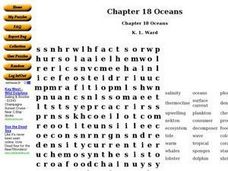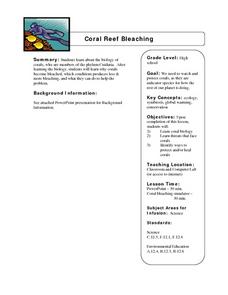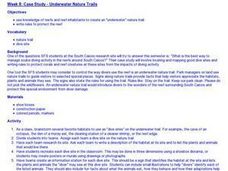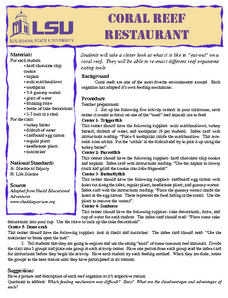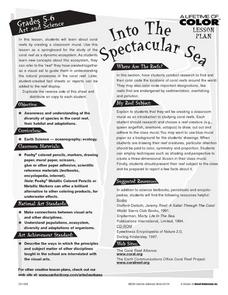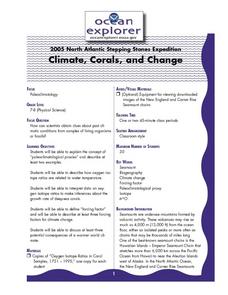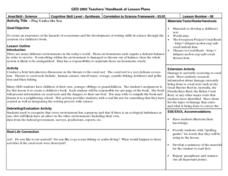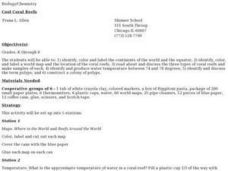Curated OER
Chapter 18 Oceans
In this earth science worksheet, learners identify and locate various vocabulary terms pertaining to the ocean and living things found in the ocean. There are 27 ocean terms located in the word search.
Curated OER
Invertebrate Word Search
For this biology worksheet, students identify and locate vocabulary terms related to various types of invertebrates. There are 21 biology terms located in the word search.
Curated OER
What Is It?!
Working individually or in groups, 4th graders are presented with unusual or at least unfamiliar objects and are asked to speculate on what they are and/or how they are used. The intention is to get students to make careful observations...
Curated OER
Coral Reef Bleaching
Students explore the structural biology of corals. Working individually, students identify how corals become bleached and which conditions produce more and less coral bleaching. Students explore how this effects the environment and...
Curated OER
Underwater Nature Trails
Students research dive sites on an underwater nature trail that would introduce divers to the wonders of the reef surrounding South Caicos. They then recreate each dive site using shoe box diorama and create an information station at...
Curated OER
Coral Reef Restaurant
Students explore coral reefs by re-enacting different reef organisms.
Curated OER
Egg Carton Coral
Young scholars use egg cartons to construct models of coral colonies showing
many aspects of the coral's natural history - including the structure of
coral polyps and the coral colony's colonial life style.
Curated OER
Who's Your Neighbor?
Students recognize and identify some of the fauna groups found in deep-sea coral reef communities. They describe common feeding strategies used by benthic animals in deep-sea coral reef communities.Students be able
Curated OER
Seals, Corals and Dollars
Students described the ecological relationships between Hawaiian monk seals and deep-water precious corals. They describe and explain at least two different viewpoints on how monk seals and precious coral resources
Curated OER
Currents: Bad for Divers; Good for Corals
High schoolers describe, compare, and contrast major forces that drive ocean currents. They discuss the general effects of topography on current velocity. They discuss how velocity affects the ability
Curated OER
Spawn!
Pupils explain that the ability of certain reef fishes to have a successful spawning is dependent on numerous environmental conditions. They list some of the factors needed by reef fishes in the South Atlantic Bight to have a
Curated OER
Conservation
Fifth graders examine how destructive fishing practices affect the health of coral reefs. They watch a Powerpoint Presentation, conduct an experiment, and in small groups create a Powerpoint Presentation.
Curated OER
The Formation And Types of Coral Reefs in Insular Southeast Asia and their Inhabitants
Students study the geological formation and inhabitants of the coral reefs in Southeast Asia. They investigate how the effects of weather and human activity on these ecological systems.
Curated OER
Into the Spectacular Sea
Students research coral reefs as dynamic ecosystems and the part that each organism plays within that ecosystem. They create a mural of a coral reef.
Curated OER
Are You Related?
High schoolers study microsatellite markers and explain how they might be used to identify populations. They use data to make inferences about the populations of deep-sea corals.
Curated OER
Climate, Corals, and Change
Students examine oxygen isotope ratios and how they are related to water temperature. They also identify three forcing factor changes for climate change.
Curated OER
Play Under the Sea
Students explore the hazards of ecosystems and utilize their writing skills to create a studenT book. Threats to the ecosystem of the coral reef are discussed and used as a model for the research of the group.
Curated OER
OCEAN PAINTINGS
Fifth graders research animal life in a coral reef. They learn and use the wax-resist technique for painting, and create a picture of an ocean animal.
Curated OER
Sexy Coral Reef and I Want My Own Space
Fifth graders explore how coral polyps increase the chances of egg and sperm meeting after being released into the vast ocean waters.
Curated OER
The Coral Reef
Fourth graders discuss life in a coral reef, and view photographs and a computer program about coral reefs. They design and create colorful watercolor, ink, and crayon drawings of coral reefs.
Curated OER
Cool Coral Reefs
Students identify, color and label the continents of the world and the equator. They identify and produce water temperature between 74 and 78 degrees. They identify and discuss the term polyps and construct a colony of polyps.
NOAA
Noaa: 25 Things You Can Do to Save Coral Reefs
Resource presents 25 things you can do to save coral reefs.
Country Studies US
Country Studies: Maldives: Geography
This article from the Country Studies of the Library of Congress discussed the interesting geography of the Maldives Islands. See the problems caused because the islands are barely above sea level.
NOAA
Noaa: Make an Edible Coral Reef [Pdf]
Read about and view pictures of coral reefs. Then make a cake model of a coral reef and eat your way to a better understanding of life around these marine environments.


